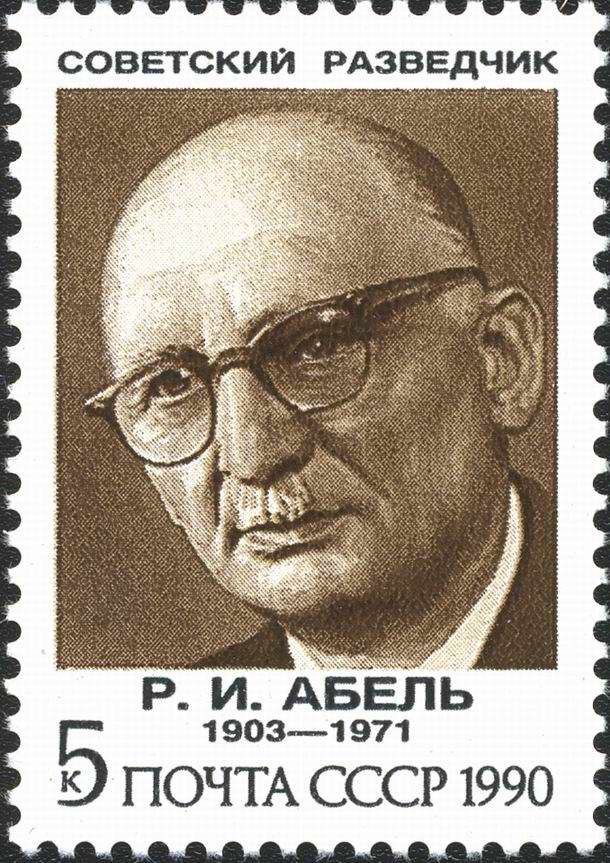You are viewing the article Rudolf Abel at Tnhelearning.edu.vn you can quickly access the necessary information in the table of contents of the article below.

(1903-1971)
Who Was Rudolf Abel?
Rudolf Abel was born William Fisher in England in 1903. Operating as a Soviet spy in New York City, he was imprisoned for espionage following a high-profile trial in 1957. In 1962, he was released to the Soviet Union in exchange for captured U.S. pilot Francis Gary Powers. The longtime intelligence operative died in Moscow in 1971, his story later revived in the 2015 movie Bridge of Spies.
Early Years and Career
Rudolf Abel was born William August Fisher on July 11, 1903, in Newcastle upon Tyne, England. His parents Heinrich and Lyubov were Bolshevik supporters from Russia, and young Fisher helped his father by distributing “Hands Off Russia” literature during World War I.
Following his family’s return to Russia in 1921, Fisher joined the Komsomol, the Communist Party youth organization, and worked as a translator. He eventually became fluent in several languages and developed a love for radio communications. After completing a two-year stint with a radio battalion of the Red Army, he joined the OGPU security agency in 1927.
A member of the OGPU’s “illegals” division, Fisher spent several years training operatives in radio work throughout Europe. He was dismissed from the agency during the Great Purge of the late 1930s, but he returned to its service after the Nazi invasion of the Soviet Union in 1941.
U.S. Capture, Trial and Release
In 1948, Fisher slipped into the United States illegally by way of Canada. He served as a case officer for the “Volunteer” spy network, which was tasked with relaying atomic secrets, and was awarded the Order of the Red Banner in 1949.
During this period, Fisher posed as a photographer and painter named Emil R. Goldfus and immersed himself in a Brooklyn artistic community. He occasionally met with Reino Häyhänen, another Soviet agent residing in New York. However, Häyhänen performed his duties poorly, and when he was recalled to the Soviet Union in 1957, he instead fled to the U.S. Embassy in Paris and revealed his secrets.
Thanks to information offered by Häyhänen, Fisher was tracked down and arrested at the Latham Hotel in Manhattan. A search of his Brooklyn studio uncovered a hollow pencil used for concealing messages, a code book, radio transmitting equipment and phony identifications. Charged with espionage, he confessed to being a Soviet spy named “Rudolf Ivanovich Abel” — believed to be a signal to his superiors that he had been captured.
Fisher was assigned New York lawyer James B. Donovan, and the two developed a strong rapport. Donovan successfully argued against the death penalty for “Colonel Abel” by suggesting he could be used for a future prisoner exchange with the Soviet Union. The lawyer even appealed Fisher’s 45-year prison sentence on the grounds that the search of his studio had been unconstitutional, though the Supreme Court upheld the original ruling in 1960.
Shortly afterward, when U.S. jet pilot Francis Gary Powers was captured in Soviet territory, the idea of swapping Powers for Fisher gained steam. Donovan traveled to the Soviet embassy in East Berlin to negotiate the exchange, and on February 10, 1962, the two prisoners crossed paths as they were released on the Glienicke Bridge between East and West Germany. Afterward, Fisher sent Donovan two rare manuscripts as a show of his appreciation.
Later Years and Movie
Fisher was publicly feted a hero upon his return to the Soviet Union. He received the acclaimed Order of Lenin in 1966, and published his KGB-approved memoirs in 1968. However, private treatment by the agency he had served for decades was not as warm. Forced into retirement in 1971, he died of lung cancer on November 15 of that year.
The drama of Fisher’s trial and the subsequent negotiations that led to the prisoner exchange were revived with the release of the 2015 movie Bridge of Spies. The Steven Spielberg-helmed flick starred Tom Hanks as Donovan, with British actor Mark Rylance taking on the role of the mysterious Soviet spy.
QUICK FACTS
- Name: Rudolf Abel
- Birth Year: 1903
- Birth date: July 11, 1903
- Birth City: Newcastle Upon Tyne
- Birth Country: England
- Gender: Male
- Best Known For: Soviet spy William Fisher, a.k.a. Rudolf Abel, was convicted of espionage in the United States in 1957 and later exchanged for imprisoned American Francis Gary Powers.
- Industries
- Cold War
- Astrological Sign: Cancer
- Death Year: 1971
- Death date: November 15, 1971
- Death City: Moscow
- Death Country: Russia
Fact Check
We strive for accuracy and fairness.If you see something that doesn’t look right,contact us!
CITATION INFORMATION
- Article Title: Rudolf Abel Biography
- Author: Biography.com Editors
- Website Name: The Biography.com website
- Url: https://www.biography.com/crime/rudolf-abel
- Access Date:
- Publisher: A&E; Television Networks
- Last Updated: May 18, 2021
- Original Published Date: October 14, 2015
Thank you for reading this post Rudolf Abel at Tnhelearning.edu.vn You can comment, see more related articles below and hope to help you with interesting information.
Related Search:



